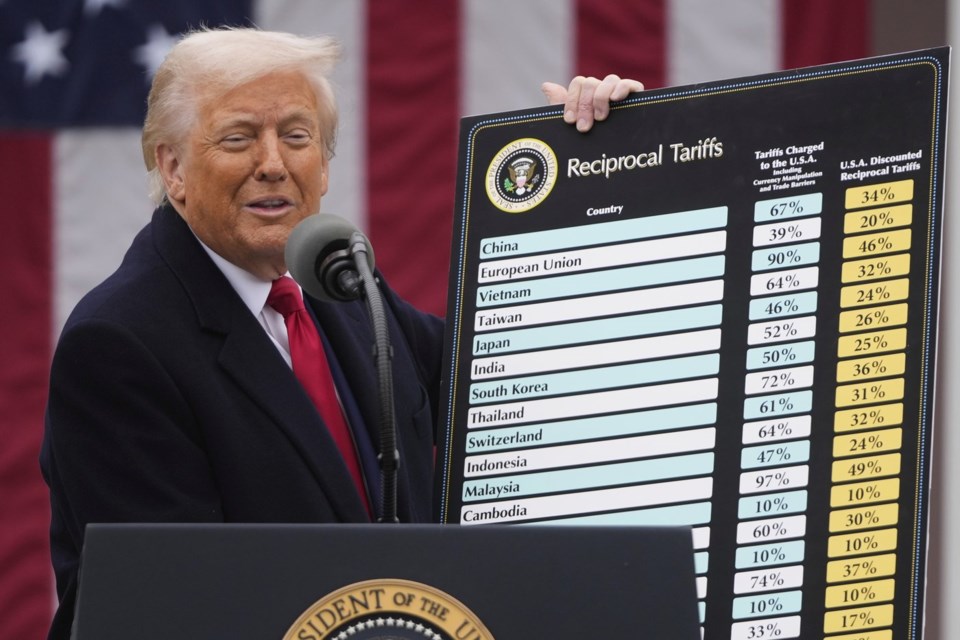WASHINGTON — Prime Minister Mark Carney will address reporters shortly after the White House declared both Canada and Mexico exempt from new reciprocal tariffs announced today by U.S. President Donald Trump.
A fact sheet from Trump's office says goods imported under the existing continental trade deal, known as CUSMA, will not face tariffs, while those outside the deal will see a 10 per cent tariff.
Canada was left off a lengthy list Trump unveiled this afternoon showing the tariff levels most other countries will face starting Thursday.
Trump also said he is going ahead with previously announced 25 per cent tariffs on automobile imports Thursday.
Carney with his cabinet committee on U.S. relations Wednesday and is set to speak Thursday with premiers.
Trump has said he would impose reciprocal tariffs by increasing U.S. duties to match the tax rates other countries charge on imports.
Ontario Premier Doug Ford said the signals Wednesday from the White House were positive and reflected his efforts to press Canada's case through meetings with Trump administration officials and American media interviews.
"This all goes back to relationships," he said. "I've always believed in that in business and government, you have to build a relationship. I believe we have built it."
Saskatchewan Premier Scott Moe had a similar comment.
"We remain concerned about the previously announced tariffs on Canadian steel and lumber, and will continue to engage with the U.S. to have these tariffs removed," Moe wrote in a media statement.
"For now, it appears that Canada’s approach of a coordinated, strong and measured response while continuing to engage with U.S. government officials at all levels has been successful."
As Liberal leader, Carney paused his federal election campaign Wednesday to take part in meetings in Ottawa with his Canada-U.S. relations council and a cabinet committee.
Carney spoke Tuesday with Mexican President Claudia Sheinbaum. His office said it was "a productive call" that touched on Carney's plan to increase trade between the two countries to fight Washington's "unjustified trade actions against Canada" and blunt the impact of tariffs.
At her Wednesday morning press conference, Sheinbaum said that the two spoke about strengthening the Canada-U.S.-Mexico-Agreement on trade, negotiated during the first Trump administration.
"We agreed that it's very important to keep communicating with the United States, because of the importance of the integration of our three economies," she said in Spanish.
In early March, Trump imposed — and then partially paused — 25 per cent across-the-board tariffs on Canada and Mexico, with a lower 10 per cent levy on energy, and linked the duties to the flow of fentanyl across the border.
U.S. government data shows that only a very small volume of the drug is seized at the northern border. The Annual Threat Assessment report, released last week, does not mention Canada in its section on illicit drugs and fentanyl.
Yet an incoming U.S. Senate resolution to end the emergency at the northern border has put Canada back in the president's crosshairs on social media.
"Mitch McConnell of Kentucky, Susan Collins of Maine, Lisa Murkowski of Alaska, and Rand Paul, also of Kentucky, will hopefully get on the Republican bandwagon, for a change, and fight the Democrats wild and flagrant push to not penalize Canada for the sale, into our Country, of large amounts of Fentanyl, by Tariffing the value of this horrible and deadly drug in order to make it more costly to distribute and buy," Trump posted just before 1 a.m. EDT Wednesday.
It's not clear what the president meant when he said he would impose tariffs on fentanyl coming from Canada.
As of Wednesday evening, Democrat senators were planning to force a vote on Trump's use of the International Economic Emergency Powers Act, also called IEEPA, to declare an emergency over fentanyl trafficking in order to hit Canada with tariffs. Sen. Tim Kaine on Tuesday called it a "made-up emergency."
The vote could put Republican lawmakers from states that rely heavily on trade with Canada in the rare position of opposing Trump's tariff agenda. Republican Sen. John Barrasso told Wednesday's Senate hearing that Trump's tariffs are necessary to secure the border with Canada and that the president is "not going to let up."
But Susan Collins, a Republican senator from Maine, said that Canadian "neighbours" are working with American law enforcement and the problem of fentanyl at the northern border is small. She said the Maine economy is intertwined with Canada's and the tariffs would be devasting for businesses and families in her state.
Even if the Democrats' resolution gets enough Republican support to pass the Senate, it probably won't stop Trump's emergency declaration because it's not likely to come up in the House. Trump said on social media that "it is not going anywhere because the House will never approve it and I, as your President, will never sign it."
— With files from Dylan Robertson in Ottawa and Allison Jones in Toronto.
This report by The Canadian Press was first published April 2, 2025.
Kelly Geraldine Malone, The Canadian Press




